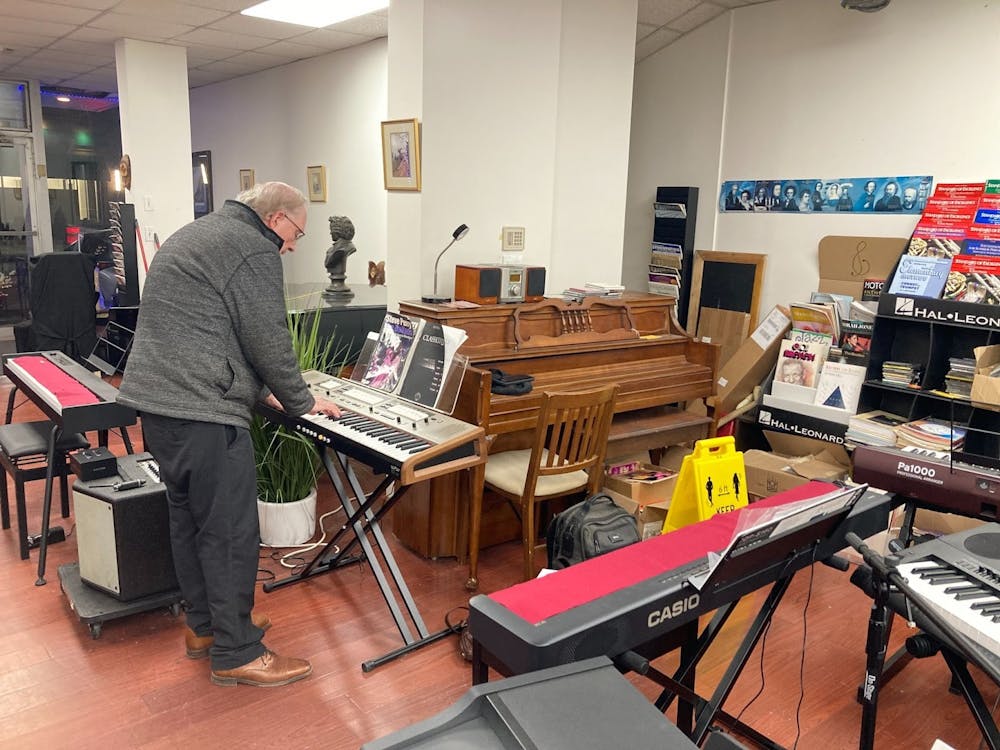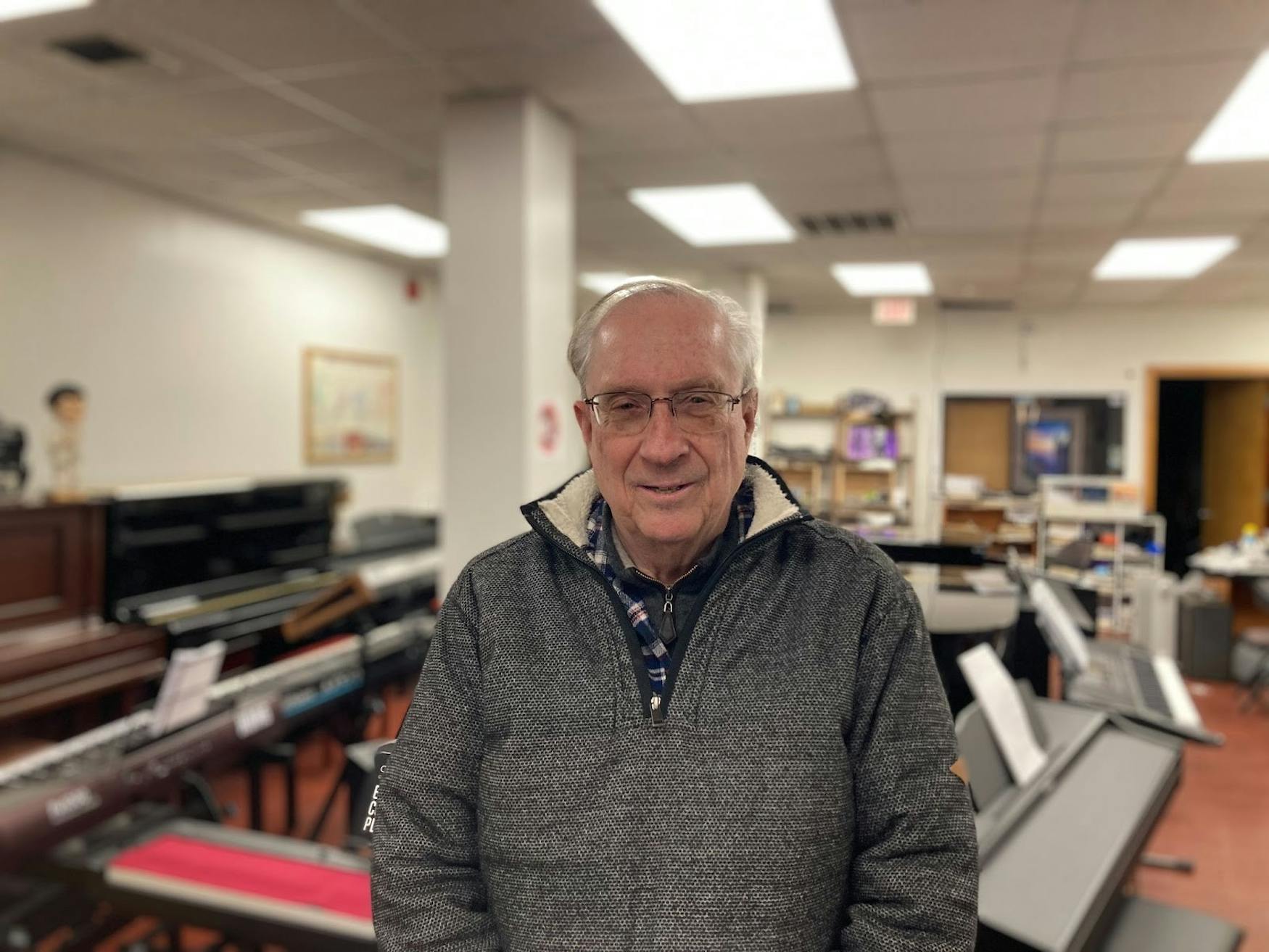Waltham’s Main Street Music celebrates 30 years in business
Owner Bob Lupo tells the Justice about the past, present, and future of the charming local music shop.
In 1993, when 719 Main Street was put up for sale by a group of negligent owners who had allowed it to fall into disrepair as a decrepit doctor’s office, Bob Lupo was at a turning point.
“I’d gone in for a physical, and they’d found a tumor. I said to myself, ‘If I get out of this freakin’ thing alive, I ought to do something I love — something that makes people happy,” Lupo told the Justice during a March 11 interview.
Thankfully, he did make it out alive. Lupo grew up in Cedarwood — the neighborhood right behind Massell Quad, with a view of the Chapels from his backyard. Playing Hammond organs gave him an early love of music — though with his thick Boston accent it sounds more like Heh-mind ah-gins — and soon enough he was flying around the country for piano and organ showcases. For years, he was a panelist for the international trade show of the National Association of Music Merchants (NAMM), presenting on the state of organ technology and the future of the industry. Over time, by immersing himself in the piano business scene, he accumulated a number of direct distribution lines for piano and keyboard manufacturers.
At the same time, he was earning a law degree at Suffolk University and starting to practice in Newton. Lupo was successful but jaded — he’ll tell you all about the corruption of the lawyers and judges he came across in his practice. So, fed up after his health scare in 1993, he decided to focus on his real passion: pianos.

PIANO MAN: Bob demonstrates his skills.
For years, he’d been nursing a large collection of used acoustic and digital pianos in a small colonial house in Weston after he bought the 719 Main Street property, leasing out the other suites to stock traders, a barbershop, and, ironically, lawyers. His first set of employees were a group of music business students from the University of Massachusetts Lowell, who helped him name the place “Piano Man Inc.”
From the various lines of piano distribution, his most profitable being from the Japanese company Kawai Instruments. Lupo saw incredible success. “I was importing salespeople from all around the country, taking out ads in the [Boston] Globe every month, and we were selling hundreds of thousands of dollars of pianos,” he said.
But in the late 90s, the rug got pulled out from under him. “One day, I got a letter from Kawai saying they were taking away my line and giving it to somebody else. The piano industry — it’s like the wild west.” The keyboard market relies on ground-level salespeople of giant manufacturing conglomerates, Lupo elaborated. Thus, aficionados and business owners like Lupo work independently to build ties to relatively low-level representatives of, for example, Steinway & Sons Pianos or Yamaha Corporation Pianos. That way, they can get wholesale deals at trade shows and be the only resellers in their area. But those flimsy lines are not set in stone or contract and can be cut at any time on the whim of a random Steinway employee or the vain politics of another business owner two towns over.
Meanwhile, the market for acoustic pianos was shrinking. Mass-produced knockoffs of classic European brands — mostly manufactured in China — started to flood the scene in the early 2000s, creating a price vacuum that small business owners like Lupo simply could not match. “They’ll take some high-class German name like Neumeyer and stamp it on there, and sell them for nothing,” Lupo said. “The layman may not be able to tell the difference, but in terms of lasting quality and performance, they can’t touch the American products.” Digital pianos also began overtaking acoustics, creating a stark contrast from the cultural staple of the living room grand piano of the 20th century. Lupo says, “most people were just using them as a display for their picture frames.”
Since he started his business, Lupo said his experiences have been up and down. “It's never been an easy ride — still isn’t.” He does not take out ads anymore, and gone is his large team of salespeople. The pandemic took a major toll on the shop, especially on their sales of physical music books. But he would like to get back in the saddle. “There’s still demand for these digital keyboards, and I have a building on Felton Street that I’d like to turn into a community music center.” As of right now, though, business has been slow, and Lupo is working on rejuvenating interest in 719.

ON DISPLAY: The store has an impressive section of guitars and other instruments.
What shines through the seasonal clouds of difficulty is Lupo’s genuine love for the instruments. “I always say, every piano has a ghost. You never know who played it. We have the old Red Sox organ in here — that’s history.” He has much more to display than 719 Main Street can hold: old pianos, new ones, uprights, grands, Baldwins, Steinways, Hammonds, you name it. The collection available for purchase is a tiny fraction of what he has accumulated throughout his life. But his goal is to get them out, in front of people. “I’d like to do something that makes people happy, and that’s always been the goal.”
Visit Main Street Music for acoustic and digital pianos, electric and acoustic guitars and gear, and music books, conveniently located along the Waltham shuttle route.



Please note All comments are eligible for publication in The Justice.